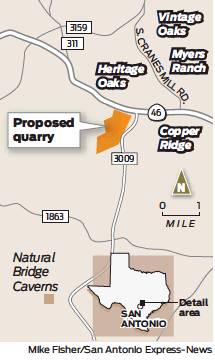Hearing likely as TCEQ takes look at quarry plan
By John MacCormack STAFF WRITER
A controversial plan by Vulcan Materials to mine limestone on a 1,500-acre site near the busy intersection of Texas 46 and FM 3009 in Comal County will go before the Texas Commission on Environmental Quality on Wednesday.
Although the commissioners could rule on Vulcan’s pending air permit application, they are more likely to designate it for a contested hearing and send the matter to an administrative law judge, as requested by numerous parties.
Both TCEQ’s executive director and its Office of Public Interest have made that recommendation.
“We’re fairly confident they will refer it to the State Office of Administrative Hearings,” said Sabrina Houser Amaya, a spokesperson for Friends of Dry Comal Creek, a group that opposes the quarry that, according to Vulcan, could be in business for 80 years.
According to Amaya, there are 12,000 residents within a 5-mile radius of the site. Almost 700 are on the TCEQ’s “interested persons” list for the application.
If the commission does refer the matter to an administrative law judge, as expected, it will also decide what issues are to be heard by the judge and will name the affected parties.
Although a contingent of Comal County residents is expected to attend the hearing, they will not be able to participate.
“The commissioners will not take oral argument or additional comment on this matter in this public hearing,” said Brian Mc-Govern, a TCEQ spokesperson.
The window for filing written comments on the application closed in February. Several hundred people have commented. About 200 different people, groups and government entities requested a contested hearing on the matter.
While opponents of the proposed project are complaining that the project will mean an increase in heavy truck traffic, exhaust from machinery and dust emissions caused by the rock crusher, not all of those issues are not subject to TCEQ oversight.
“All the trucks going in and out of there, the machinery generating dust and diesel emissions don’t count. It’s only the dust emissions from the rock crusher,” Houser said.
And while Vulcan has promised to be a good neighbor and to use buffers and setbacks to limit the quarry’s impact, and also to protect water resources, the project has won few supporters.
Vulcan has also defended its environmental track record, noting the company, which operates 15 plants in Texas, has achieved the TCEQ’s highest compliance rating.
“We have never been cited for any air permit violations in Texas,” company spokesman Scott Burnham said earlier this year.
The opposition group, however, believes that Vulcan’s air modeling and air dispersing data is flawed. It has provided data compiled by its expert to the TCEQ. That analysis predicts emissions will be much higher than projected, Houser said.
Local residents have also expressed fears about groundwater depletion, property devaluation and toxic runoff.
At a public hearing in February, which drew nearly 500 people, dozens spoke against the project, and 600 comments were made on the TCEQ website.
